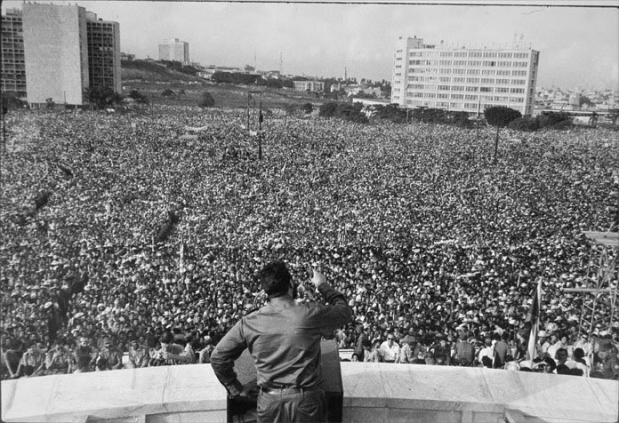
On 13 March 1963, during a commemoration on the steps of the University of Havana, Fidel Castro said: “For there walks a specimen, another byproduct we must fight (…), many of these lazy ‘hipsters,’ children of the bourgeois, walk around in their too-tight pants, some of them with a guitar thinking they’re Elvis Presley. And they have taken the extreme liberty of going to public spaces and freely organizing their ‘feminine shows’ (…), they are all linked, the little lumpen, the lazy, the Elvis Presleys, the tight jeans.
Then Castro added, “Don’t let these ‘hipsters’ think the streets of Havana are the streets of Miami.”
Also on a March 13th, but in 1968, Castro himself launched the so-called General Revolutionary Offensive, an operation that gave the coup de grace to small- and medium-sized private businesses, and that also killed the nightlife in the capital and in the whole country.
In the final months of 1967, in Czechoslovakia, the process of social democratization began that was remembered as the “Prague Spring”; something that set off an alarm in almost all the countries tied to the Soviet axis.
On 21 August of that year Russian military power occupied Czechoslovakia and dismantled the government of that country with the consent of the then Kremlin strongman, L.I. Brezhnev. This same year, in May 1968, there was the student rebellion that turned France upside down.
Meanwhile, in Cuba, in the months before March 1968, the usual audience of the nightclubs walked up and down La Rampa trying to kill their boredom. They take a turn around the central tower of the Coppelia Ice Creamery, along with spells at the cafe known as El Carmelo at 23rd, near the intersection of this street and the Avenue of the Presidents.
Other places frequented were the terrace of the cafe at N and 21, next to the Hotel Capri, the gardens of the Hotel Nacional gardens, and, in the area where it was located at the time, the Czechoslovak House of Culture.
A segment of youth, those who were assigned the adjective “enfermitos” — little sick ones — walked La Rampa at risk. The “hipsters” of the time, with their tight pants of Chinese khaki, their sleeveless shirts with embroidered decorations and their modified workboots. Long hair was the privileged headache of some.
In those days the young poet from Holguin, Delfín Prats, read his poems, “Language of Mutes,” in public. The Beatles’ White Album was listened to in secret.
At the same time, Ana Lasalle and her enthusiastic court of rabid leftists ravaged Vedado. The frenzied Communist lady actress wielded her scissors against manes and miniskirts. These scissors had their longest night on 25 September 1968, exactly 45 years ago today.
Around 9:00 at night that Saturday, a police cordon with uniformed and plainclothes officers fell on the area. The indiscriminately took prisoner everyone from casual passersby to pimps who besieged the Hotel Capri, where sometimes Greek or French sailors from ships anchored in the harbor stayed. The detainees were classified into three groups: Homosexuals, Hippies, and the third classification: Improper conduct.
According to those who experienced the events, two members of the rock group Los Pacificos were arrested very close to the corner of N and 23rd. That group, like another named Los de León (later, Los Kents), were very popular at the time among young rock fans in the Vedado area.
The group Los Pacificos didn’t survive the consequences of that harsh and bitter night and broke up.
In his speech on Tuesday, 28 September, Fidel Castro referred to the events of the previous Saturday. He justified the raid as a part of the offensive being waged against “social evils.” He generally accused those arrested of being involved in vagrancy, pimping minors and other things of this type.
On Sunday 12 October, the newspaper Juventud Rebelde (Rebel Youth) published an extensive compendium about the raid that had occurred days earlier. The headline read, “Yankee Dream Destroyed, the boys of the fourth world.”
Other articles appeared in the style of: “How do bands of juveniles converted into vehicles of imperialist propaganda think and act?” There was also a photo essay, with images of some of the boys arrested under the title, “Is this what you want for your son?”
Specifically, an article by the journalist Alfredo Echarry noted: “Encouraged by the role models of imperialism and inspired by the workings of their youth gangs, they try to give a structure to disorganization. Immediately, groups and bands identified by different names begin to emerge, among them: The Zids, Los Chicos Now, Los Chicos Melenudos, Los Betts, Los Chicos de la Flor, Los Chicos del Crucifijo, Los del Palo, Los Sicodélicos, Los del Banano…” Within Echarry’s article, the term “ideological divisiveness” was the condemnatory stigma.
Today, 45 years later, the ghosts of that night of the long scissors seem to be revived in the schools. The “moralizing” offensive of Raulism evokes the demons of “the night of the three P’s” and that tragic 25 September 1968.
Although it seems incredible, the Revolutionary terror lurks still, ready to attack and “bring to heel” a society ever more disenchanted and rebellious.
Camilo Ernesto Olivera, Havana
From Diario de Cuba
25 September 2013
